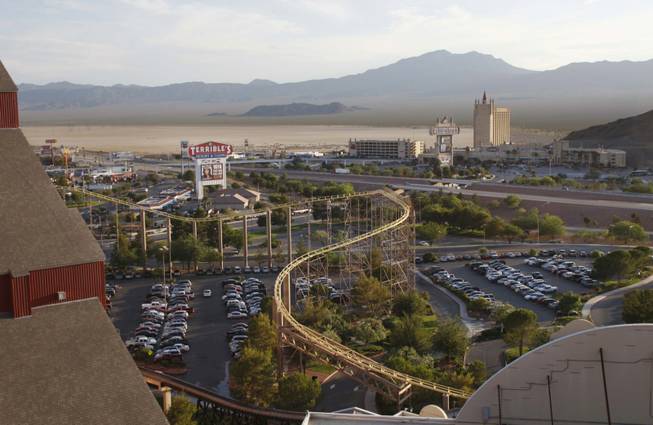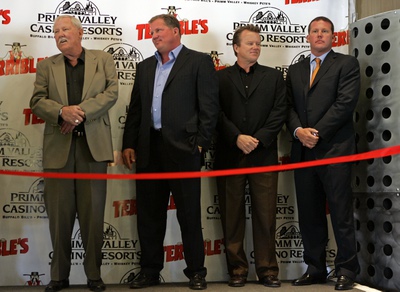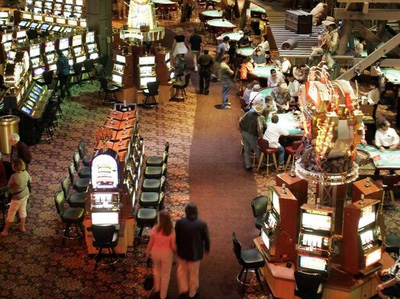
The Herbst Gaming casinos in Primm are visible from the roller coaster at Buffalo Bill’s.
Thursday, Sept. 10, 2009 | 2:35 p.m.
Sun Archives
- Herbst Gaming files for bankruptcy protection (3-22-09)
- Herbst Gaming seeking bankruptcy protection (3-10-09)
- Primm hotel rates for locals: free (12-09-08)
- Primm hotel closes rooms during midweek (10-30-08)
- Lenders give Herbst Gaming more time to repay debts (5-23-08)
Herbst Gaming Inc.'s plan to emerge from bankruptcy is facing stiff resistance from key creditors and lenders owed hundreds of millions of dollars.
The lender and creditor critics charge Herbst and subsidiaries in the bankruptcy case engaged in dubious casino acquisition deals that overwhelmed the Las Vegas company with debt and improperly placed the interests of senior lenders ahead of junior lenders and other creditors.
Attorneys for Herbst have denied these allegations and are pressing forward with a proposal to emerge from bankruptcy by turning the company and its subsidiaries over to senior lenders that are owed $876.5 million and that have agreed to assume another $350 million in secured debt.
Since the Herbst casinos and slot route business are worth only an estimated $500 million to $600 million, junior lenders owed another $362 million would recover nothing on those notes and that debt would be canceled under the Herbst plan.
The plan is under attack by the junior lenders and the bankruptcy case's Official Committee of Unsecured Creditors, which is seeking court approval to prosecute fraudulent-transfer claims and other allegations against Herbst.
At issue are Herbst's acquisitions in 2007 of the Sands Regent hotel-casino properties in Northern Nevada for $153 million and the $400 million purchase of the complex of three hotel-casinos in Primm, on I-15 south of Las Vegas.
The unsecured creditors called these deals "ill-conceived and highly-leveraged" and said they were executed at "inflated prices that were financed by over $500 million in new debt, which more than doubled the debtors' then-existing debt load to an unsustainable level."
"That new debt rendered the debtors insolvent, without sufficient capital to operate their businesses, or otherwise left the debtors unable to pay their debts as they became due," the creditors charged in a July filing with the court.
"Only by commencing this action, can the committee realize on unsecured creditors’ reasonable expectation, when they extended credit to the debtors, that the debtors would not recklessly encumber their assets with debt that could not be repaid as part of a foreseeably misguided and debt-fueled expansion," the creditors said in their filing.
Herbst, the creditors said, had about $520 million in debt at the end of 2006 -- including debt taken on in 2004 to expand its casino operations into Iowa and Missouri. The Sands and Primm deals caused Herbst's debt to jump to $1.146 billion at a time when business was already slowing because of a Nevada smoking ban affecting Herbst's slot route operations, the creditors charged.
"The debtors’ officers, whose prior gaming experience focused on slot-route operations, had no experience managing casinos, hotels and resorts of the size and type they were acquiring. In addition, just prior to the acquisitions, a smoking ban was enacted that the debtors expressly acknowledged would have an adverse impact on casino and slot-route performance. Thus, the acquisitions and resulting increase in debt were blatantly unreasonable, and a bad-faith derogation of the interests and reasonable expectations of the debtors’ other creditors," the creditors said.
The unsecured creditors also complained that the company, controlled by the Herbst family, was harmed by a larger pattern of breaches of fiduciary duty, misconduct and mismanagement by the debtors’ officers and directors that it claims involved excessive salaries to Herbst officers and improper deals involving sister company Terrible Herbst, a convenience store chain.
"That pattern of misconduct was designed to enrich the debtors’ insiders at the expense of the debtors. In some cases, the insider defendants took actions designed to shift value from the debtors to members of the Herbst family, which controls the debtors," the creditors charged.
The creditors alleged the controlling Herbst brothers -- Edward, Timothy and Troy -- "diverted substantial amounts of value" from Herbst Gaming to themselves, their father Jerry Herbst and to Terrible Herbst.
The unsecured creditors are questioning:
--A deal to license the Terrible Herbst trademark for a fee that they say appears to be in excess of fair market value.
--Arrangements in which Herbst Gaming employees may be working almost exclusively for Terrible Herbst but are principally paid by Herbst Gaming.
--Deals not at "fair value" in which Herbst Gaming pays Terrible Herbst for the right to operate ATMs in Terrible Herbst convenience stores and pays Terrible Herbst transaction fees.
--Deals in which Herbst subsidiary ETT operates slot machines in Terrible Herbst stores.
--An arrangement in which Sean Higgins was general counsel for both Herbst Gaming and Terrible Herbst when the related-party contracts were signed. The creditors say this involved "conflicting interests" and violated "the controlling ethical canons." They charge Higgins aided and abetted the Herbst brothers in breaching their fiduciary duties.
"Several factors suggest that these related-party transactions are less favorable to the debtors than they would be if they were with unrelated parties," the creditors complained.
The unsecured creditors are proposing to pursue a class-action complaint against Herbst on behalf of certain holders of $875 million in debt incurred on Jan. 3, 2007.
The creditors complained that on March 9, 2009, before the bankruptcy, Herbst entered into a "lockup agreement" with lenders holding about 68 percent of that debt in which Herbst agreed to pay Wilmington Trust Co., as agent for the lenders, some $8.1 million in past-due interest. The creditors say this payment was improper.
"These payments constitute preferences that are recoverable by the debtors' estates," the creditors charged.
The creditors are also seeking recovery of what they call improper distributions to shareholders prior to the bankruptcy; and general and punitive damages for what they call improper self-dealing between Herbst and Terrible Herbst and "gross mismanagement" by Herbst officers.
Lender HSBC Bank, trustee for holders of the $362 million in subordinated (unsecured) Herbst debt that would be canceled under Herbst's plan, chimed in Wednesday with similar complaints about the Sands Regent and Primm deals.
In seeking the cancellation of $553 million in debt owed to secured lenders, attorneys for HSBC said this debt is related to "fraudulent transfers" because of problems with the acquisitions.
"Even the most cursory review of the debtors’ publicly filed financial statements reveals that the debtors were likely insolvent or rendered insolvent when the transactions closed. Additionally, the subsidiaries that guaranteed this massive debt, many of which were engaged in entirely separate lines of business, received no value in the transactions. Under the (debt) indentures and the Bankruptcy Code, the (subordinated) noteholders are entitled to a substantial recovery (of money owed to them)," HSBC said in its filing Wednesday.
Attorneys for Herbst have denied the allegations, calling them "meritless."
"The expense of prosecuting the proposed claims cannot be justified in light of their utter futility," Herbst said in a court filing last month responding to the unsecured creditors' request to pursue their claims.
"By April 2007, debtors could not have reasonably foreseen the subsequent devastating effect of the economic downturn in the entire United States, and in particular, Southern California and Nevada," Herbst said.
Herbst said the Sands Regent deal, which involved four casino properties in Northern Nevada; and the Primm deal with MGM Mirage made financial sense at the time -- and that since then the economics of gaming have deteriorated substantially.
"The local Nevada patrons that are the base of the debtors' business have been suffering from the highest foreclosure rates and among the highest unemployment rates in the country. Consumers within Nevada have reduced spending on travel and gaming. Nevada casinos reported a total decline of over $1.2 billion in gaming win for the year ended Dec. 31, as compared with 2007, a majority of that decrease coming from a decline from win from slot machines.
"Beyond Nevada, the unprecedented rise in the price of gasoline in the summer of 2008 reduced car travel, which particularly hurt the Primm Valley Resort properties that are dependent on travelers from California through the 1-15 corridor. Further, the subprime mortgage crisis is a factor that obviously significantly weakened Southern California in addition to the Nevada economy.
"The gaming market in Northern Nevada experienced even greater decline than that experienced in Southern Nevada," Herbst said in its filing.
Herbst also said the salaries of the Herbst brothers and the officers and directors of Herbst Gaming were in line with or lower than salaries of other local gaming executives.
Herbst said its deals with Terrible Herbst were disclosed in Securities and Exchange Commission filings and generated profit margins for Herbst Gaming that were at least 10 percent higher than unrelated third-party contracts.
As for the allegations about Higgins, Herbst said: "There is no evidence that Mr. Higgins had any information or should have had any information to indicate that Herbst Gaming was receiving less than market terms in related-party transactions with Terrible Herbst. Indeed, there is no evidence that the related-party agreements were on less than market terms. To the contrary."
Herbst and its subsidiaries filed for bankruptcy protection March 22.
Besides turning the company over to the senior credit facility lenders, Herbst now says "priority claims" and "other secured claims" in the case totaling about $1.2 million along with "general unsecured claims" of $5.9 million would be paid in full under its plan to exit bankruptcy.
The bankruptcy court has not yet ruled on the creditors' motion to prosecute their claims against Herbst or on HSBC's similar adversary complaint against Herbst.
Besides the slot route and Primm and Sands Regent businesses, Herbst owns Terrible's Hotel & Casino in Las Vegas; small properties in Henderson, Searchlight and Pahrump; and casinos in Osceola, Iowa; and in St. Joseph and LaGrange, Mo.
Like other Nevada casino operators, Herbst has seen revenue tumble this year as locals gambled less and the recession reduced visitation to the state.
For the quarter ended June 30, Herbst reported revenue of $172.7 million, down from $204.5 million in the same quarter of 2008. In the 2009 quarter, Herbst reported a profit of $4.47 million vs. a loss in the year-ago quarter of $62.4 million.
Operating in bankruptcy, the company had virtually no interest expense in the 2009 quarter vs. $29.9 million one year ago. The year-ago loss also was affected by a $34.3 million charge for the impairment of assets.




Join the Discussion:
Check this out for a full explanation of our conversion to the LiveFyre commenting system and instructions on how to sign up for an account.
Full comments policy